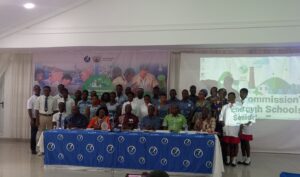Business Senior High School in Tamale has won the 3rd edition of the Senior High Schools (SHS) Renewable Energy Challenge for the Northern Sector competition.
They won marginally with 76.5 percent over Bolgatanga Girls SHS and Nkoranza Technical Institute which took the 2nd and 3rd position with 76 percent 74 percent respectively.
The three schools will compete against three other schools that emerge winners for the Southern Sector on October 19th in Accra.
At the grand finale, special packages – both in cash and products – will be awarded to the participating schools, students, lead teachers and regional STMIE coordinators. The grand prize of a complete 5kW solar PV system worth about GH₵75,000 together with science and Information Technology (IT) equipment will be given to the winning school. Contestants also stand to gain handsome prizes, including laptops, desktop computers, tablets, solar lamps and other souvenirs.
This year’s challenge is on the theme ‘Clean Cooking & Food Processing Using Renewable Energy Technologies’.
Giving a keynote address during the competition in Kumasi, Executive Secretary-Energy Commission, Ing. Oscar Amonoo-Neizer, explained the motivation behind the competition.
“The Challenge was born out of the Commission’s mandate under the Renewable Energy Act, 2011 (Act 832), which is to promote the efficient use of electricity and renewable energy resources through public education, training and regulation of entrepreneurs in the sector.
“It is also to facilitate the mainstreaming of renewable energy and energy-efficiency technologies and programmes into the curriculum of educational and training institutions. The aim of the Challenge is to promote creative thinking and provide mentorship to our young and brilliant students.
“Home-grown solutions will be needed for our clean cooking strategies in order to achieve universal access to clean cooking by 2030. Therefore, this competition will provide a platform for them to exhibit their innovative projects,” he said.

Mr. Amonoo-Neizer further emphasised that efforts are being made with stakeholders to ensure the best projects displayed by the students will get the needed attention they deserve by making them commercially viable.
“One unique thing about this Challenge is that the good projects will not end up on the shelves. There is an arrangement with the Council for Scientific and Industrial Research (CSIR) and the Clean Cooking Alliance (based in the USA) to provide mentorship for the winning projects, and other equally good ones, to develop and improve on them to become commercially viable. One likely legacy of this competition is that, in future, some schools are going to hold patent rights to technologies – which will be a major source of income to them,” he stated.
The Ashanti Regional Director of Education, Mary Owusu Afriyie, in a speech read on her behalf by Nicholas Bassaw encouraged investors to take interest in the prototype innovations of students and commercialise them whenever possible.
“This challenge will bring out innovations in renewable energy sources by our future generation, and provide orientation on the need to respect the environment and preserve it. Our collective ability to develop the ideas and prototypes that we are going to witness here into marketable products for the country will be the ultimate achievement of this project. I therefore encourage investors and industry players to take a keen interest in the ideas which will be displayed,” she said.










